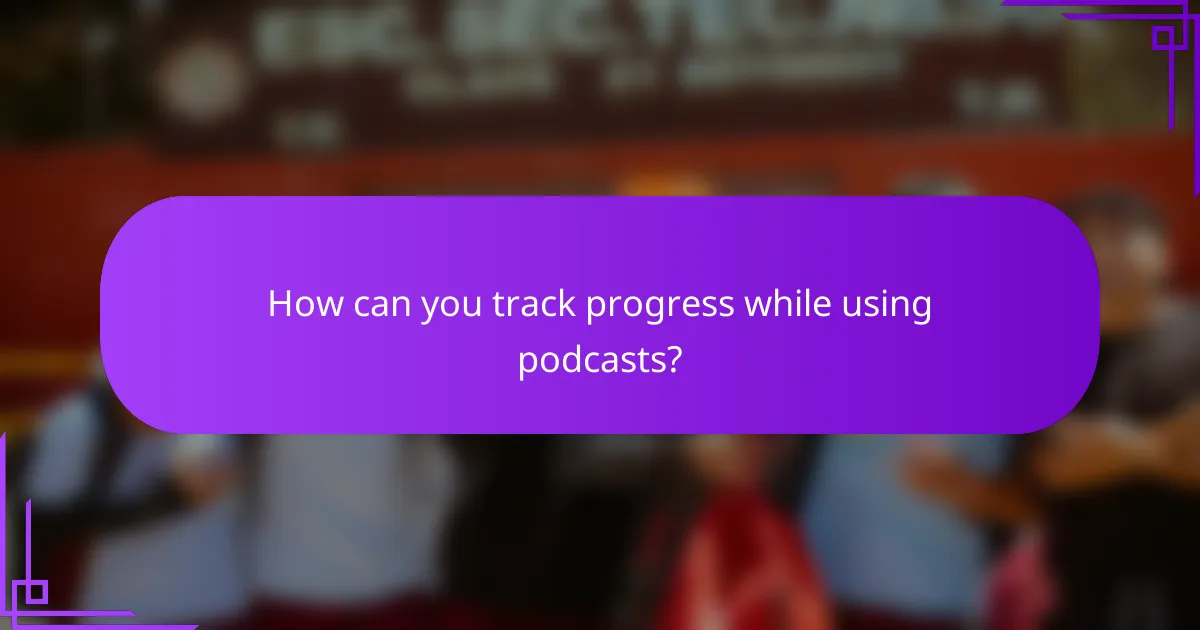Incorporating podcasts into your daily English learning routine can greatly improve your listening skills and vocabulary. By selecting podcasts that align with your proficiency level and interests, you can engage with authentic language use and cultural insights, making your learning experience both enjoyable and effective.

How can podcasts enhance English learning in the UK?
Podcasts can significantly enhance English learning in the UK by providing immersive listening experiences that cater to various skill levels. They offer learners the opportunity to engage with authentic language use, making it easier to grasp nuances and improve comprehension.
Improved listening skills
Listening to podcasts regularly helps learners develop their listening skills by exposing them to natural speech patterns and rhythms. This practice can lead to better understanding of context, tone, and emotion in conversations.
To maximize this benefit, choose podcasts that match your current proficiency level. Beginners might start with slower-paced shows, while advanced learners can tackle more complex discussions. Aim to listen for at least 20-30 minutes daily to see noticeable improvement over time.
Exposure to diverse accents
Podcasts feature a variety of speakers from different regions, providing exposure to diverse English accents. This variety can help learners become more adaptable and confident in understanding different pronunciations and dialects.
When selecting podcasts, look for those that highlight speakers from various parts of the UK, such as London, Scotland, and Wales. This will not only enhance your listening skills but also enrich your cultural understanding of the language.
Increased vocabulary
Listening to podcasts introduces learners to new vocabulary and phrases in context, which aids retention and understanding. The conversational nature of podcasts allows for practical application of words and expressions.
To effectively build your vocabulary, keep a notebook handy while listening. Jot down unfamiliar words and phrases, then look them up and try to use them in your own conversations. Aim to learn 5-10 new words per week to steadily expand your lexicon.

What are effective ways to integrate podcasts into daily routines?
Integrating podcasts into your daily English learning routine can enhance your listening skills and vocabulary. By strategically incorporating them into various parts of your day, you can maximize your exposure to the language in an engaging way.
Morning commute listening
Listening to podcasts during your morning commute is an effective way to start your day with English. Whether you drive, bike, or take public transport, use this time to immerse yourself in the language. Choose podcasts that match your interests, as this will keep you engaged and motivated.
Consider selecting episodes that are around 20-30 minutes long, which fits well into most commutes. You can also listen to shorter segments if your journey is brief. This consistent exposure can significantly improve your comprehension over time.
Dedicated study sessions
Setting aside dedicated study sessions for podcast listening can deepen your understanding of English. During these sessions, focus on specific topics or themes that interest you, and take notes on new vocabulary or phrases. This active engagement helps reinforce what you learn.
Try to allocate 30-60 minutes a few times a week for this purpose. You might also consider discussing the podcast content with a language partner or tutor to further enhance your learning experience.
Incorporating podcasts into exercise
Combining exercise with podcast listening can make your workouts more enjoyable while improving your English skills. Whether you’re jogging, cycling, or doing yoga, listening to podcasts can keep your mind engaged and make the time pass quickly.
Choose podcasts that are motivating or educational to keep your energy levels up. Aim for episodes that last between 15-45 minutes, which can fit well into most exercise routines. This dual approach not only benefits your physical health but also supports your language learning goals.

Which podcasts are best for English learners?
Some of the best podcasts for English learners include those that focus on language skills, cultural insights, and practical conversations. Choosing podcasts that match your proficiency level and interests can enhance your learning experience significantly.
BBC Learning English
BBC Learning English offers a variety of programs tailored for different levels of English learners. Their content includes news reports, grammar lessons, and vocabulary tips, making it a comprehensive resource.
Each episode is designed to be engaging and informative, often featuring real-life contexts to help learners understand usage. The podcast is updated regularly, ensuring fresh content that keeps learners motivated.
EnglishClass101
EnglishClass101 provides a structured approach to learning English through podcasts that cater to various skill levels. The episodes cover a wide range of topics, from everyday conversations to cultural nuances.
This podcast also includes lesson notes and quizzes, which can reinforce learning. Subscribing to their premium service offers additional resources like video lessons and personalized learning plans.
All Ears English
All Ears English focuses on helping learners improve their conversational skills and cultural understanding. The hosts discuss common phrases, idioms, and real-life scenarios, making it practical for everyday use.
Listeners can benefit from the hosts’ engaging discussions and tips on how to sound more natural in conversations. This podcast is particularly useful for those looking to enhance their speaking and listening skills in a fun way.

What criteria should you consider when choosing podcasts?
When selecting podcasts for English learning, consider factors like language level, content relevance, and episode length. These elements will help ensure that the podcasts align with your learning goals and fit into your daily routine.
Language level
Choose podcasts that match your current English proficiency. If you’re a beginner, look for shows that use simple vocabulary and clear pronunciation. Intermediate learners might benefit from podcasts that introduce more complex language while still being comprehensible.
To gauge the appropriate level, listen to a sample episode. If you understand most of the content without excessive strain, it’s likely a good fit. Avoid podcasts that are too advanced, as they can lead to frustration and disengagement.
Content relevance
Select podcasts that cover topics you find interesting or relevant to your life. This will keep you motivated and engaged while learning. For instance, if you enjoy technology, look for tech-related podcasts that discuss current trends and innovations.
Consider the format as well. Some podcasts feature interviews, while others may be narrative-driven. Choose a style that resonates with you, as this can enhance your listening experience and retention of new vocabulary.
Length of episodes
The length of podcast episodes can significantly impact your learning routine. Shorter episodes, typically ranging from 10 to 20 minutes, are ideal for quick learning sessions during commutes or breaks. Longer episodes may provide more in-depth discussions but require dedicated time to listen.
As a practical tip, aim to mix different lengths in your playlist. This way, you can choose a quick episode when short on time and a longer one when you can fully engage. Be mindful of your attention span to ensure you absorb the material effectively.

How can you track progress while using podcasts?
To track progress while using podcasts for English learning, establish clear metrics and regularly assess your understanding and retention of the material. This can include noting improvements in vocabulary, comprehension, and speaking skills over time.
Setting learning goals
Start by defining specific, measurable learning goals. For instance, aim to learn a certain number of new words each week or understand the main ideas of a podcast episode without assistance. Setting these targets helps maintain focus and motivation.
Consider breaking your goals into smaller milestones. For example, if you want to improve your listening skills, you might set a goal to listen to three episodes per week and summarize each one afterward. This structured approach can enhance your learning experience.
Using language apps
Incorporate language learning apps that complement your podcast listening. Many apps allow you to track vocabulary, practice pronunciation, and take quizzes based on the content you listen to. This integration can reinforce what you learn from podcasts.
Choose apps that offer progress tracking features. Look for options that provide analytics on your learning habits, such as the number of words learned or time spent listening. This data can help you adjust your routine and stay committed to your language goals.


